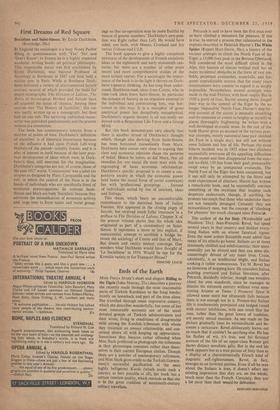First Dreams of Red Square
Socialism and Saint-Simon. By Emile Durkheim. (Routledge, 28s.)
IN England the sociologist is a busy Nosey Parker filling in questionnaires with 'Yes,' No' and 'Don't Know'; in France he is a highly respected academic writing books on political philosophy. This respectable status was first established by Emile Durkheitn, who became Professor of Sociology at Bordeaux in 1887 and later held a similar post in Paris. While at Bordeaux Durk- heim delivered a variety of interconnected lecture courses, several of which provided the basis for major monographs. The Division of Labour, The Rules of Sociological Method and Suicide have all acquired the status of 'classics.' Among these courses was 'The History of Socialism'; this too was partly written up as a monograph, but then laid on one side. The surviving unfinished manu- script was published posthumously and the present volume is a translation.
The book has contemporary interest from a number of points of view. Durkheim's 'definition of socialism' is of historical importance because of the influence it had upon French Left-wing thinker:34)f the period—notably Juares; and it is also of interest in itself because of the later prac- tical development of ideas which were, in Durk- heim's time, still exercises for the imagination. Durkheim's categories are not, of course, those of the post-1917 world. 'Communism' was a label for utopias as designed by Plato, Campanella and the rest, in which the control of the State is in the hands of individuals who are specifically freed of economic preoccupations. In contrast Saint- Simon and Marx are both 'Socialists' because they advocate the intensification of economic activity and 'urge men to form vaster and vaster group-
ings so that co-operation may be more fruitful by reason of greater numbers.' Durkheim's own posi- tion was Right rather than Left. He would have sided, one feels, with Messrs. Crosland and Jay versus Tribune and ULR.
The book appears to give a highly competent summary of the development of French socialistic ideas in the eighteenth and early nineteenth cen- turies, but there are a number of other more recent and more comprehensive studies of the same subject matter. For a sociologist the impor- tance of the book is in the light it throws on Durk- heim's,general thinking. As has long been under- stood, Durkheim took ideas from Comte, who in turn toOk ideas from Saint-Simon. In particular the concept of Society as an organism external to the individual and constraining him, was bor- rowed in this way. It is a metaphor of great analytical power but deceptively metaphysical. Durkheim's organic Society is all too easily en- dowed with a Bergsonian Life Force and a Group Mind.
But this book demonstrates very clearly that there is another strand of Durkheim's thought which, though also deriving from Saint-Simon, has been borrowed immediately from Marx. Durkheim here comes very close to arguing that class and economic relations shape the patterns of belief. Hence he infers, as did Marx, that all remedies for our social ills must start with the regrouping of basic economic relationships. Durkheim's specific proposal is to create a cor- porative society in which the economic power (and hence the moral force of social constraint) lies with 'professional groupings . . . formed of individuals united by ties of interests, ideas and feelings.'
This thesis, which bears an uncomfortable resemblance to the doctrinal basis of Italian Fascism, first appeared in the closing pageis of Suicide, but received much fuller treatment in a preface to The Division of Labour. Chapter X of the present volume shows that the whole idea originated as part of a commentary on Saint- Simon. It represents a more or less explicit, if unsuccessful, attempt to establish a bridge be- tween the sociology of Comte and that of Marx. But dream and reality seldom converge. One wonders what Durkheim would have thought of 'Le Socialisme' in 1959. Would he opt for the Kremlin variety or for Transport House?
EDMUND LEACH


























 Previous page
Previous page